University Report: Ethical Consumption of Fashion Garments Examination
VerifiedAdded on 2020/03/01
|10
|2544
|185
Report
AI Summary
This report provides a comprehensive analysis of the ethical consumption of fashion garments, exploring the complex interplay between consumer behavior, industry practices, and ethical considerations. It begins with an abstract outlining the core focus on ethical factors influencing consumer purchase decisions, followed by an introduction and literature review that highlights the growing importance of ethical consumerism within the fashion industry. The report examines how consumers make purchasing decisions based on their values, beliefs, and ethical concerns, including issues related to human and animal rights, cultural appropriation, and environmental impact. The study further delves into ethical concerns within the fashion industry, such as the use of unethical materials, labor practices, and environmental hazards. It emphasizes the importance of quality and customer satisfaction in influencing consumer intentions and decision-making. The report concludes by summarizing the key findings and emphasizing the need for the fashion industry to adopt ethical practices to ensure sustainability and meet the evolving expectations of consumers.
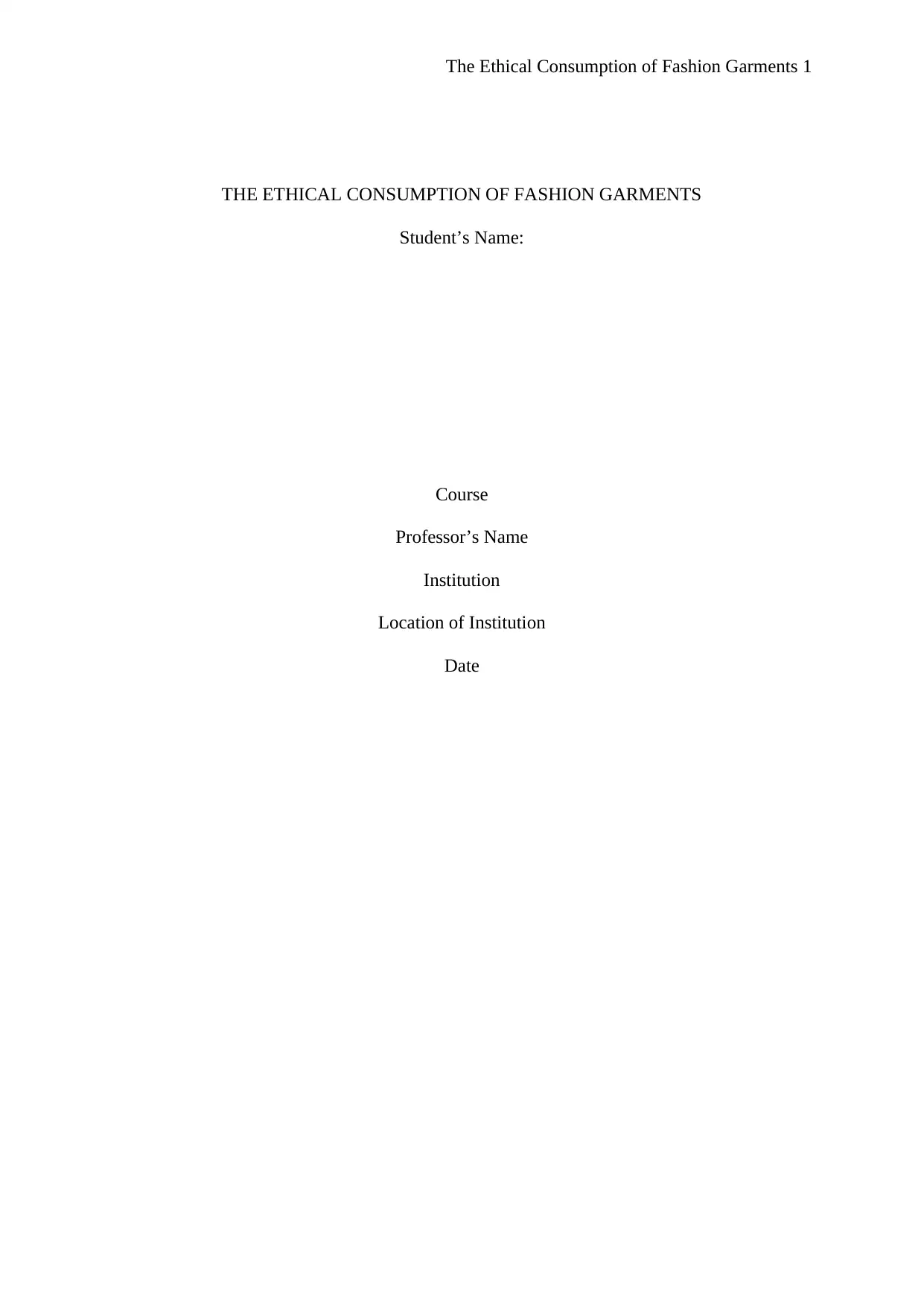
The Ethical Consumption of Fashion Garments 1
THE ETHICAL CONSUMPTION OF FASHION GARMENTS
Student’s Name:
Course
Professor’s Name
Institution
Location of Institution
Date
THE ETHICAL CONSUMPTION OF FASHION GARMENTS
Student’s Name:
Course
Professor’s Name
Institution
Location of Institution
Date
Paraphrase This Document
Need a fresh take? Get an instant paraphrase of this document with our AI Paraphraser
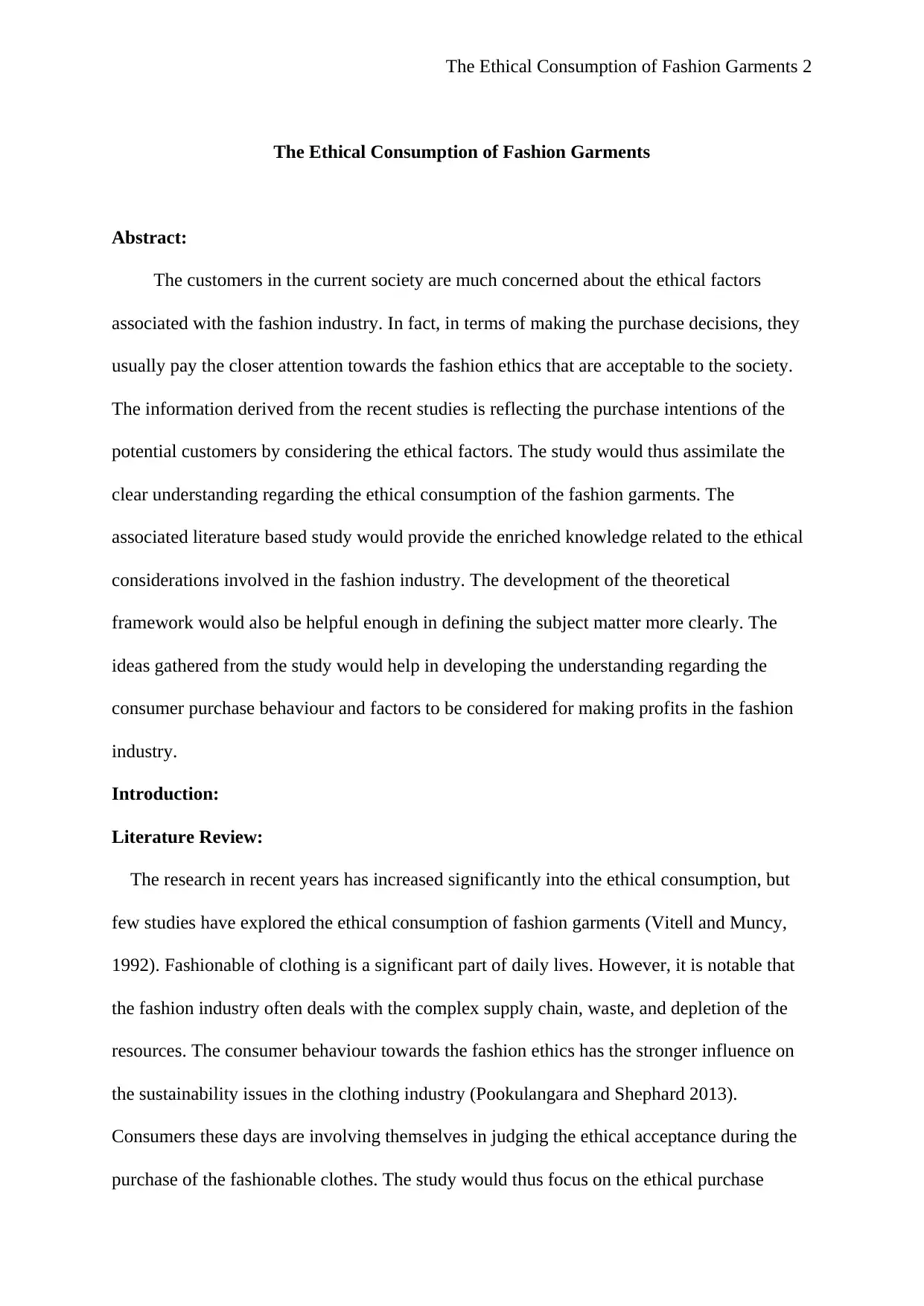
The Ethical Consumption of Fashion Garments 2
The Ethical Consumption of Fashion Garments
Abstract:
The customers in the current society are much concerned about the ethical factors
associated with the fashion industry. In fact, in terms of making the purchase decisions, they
usually pay the closer attention towards the fashion ethics that are acceptable to the society.
The information derived from the recent studies is reflecting the purchase intentions of the
potential customers by considering the ethical factors. The study would thus assimilate the
clear understanding regarding the ethical consumption of the fashion garments. The
associated literature based study would provide the enriched knowledge related to the ethical
considerations involved in the fashion industry. The development of the theoretical
framework would also be helpful enough in defining the subject matter more clearly. The
ideas gathered from the study would help in developing the understanding regarding the
consumer purchase behaviour and factors to be considered for making profits in the fashion
industry.
Introduction:
Literature Review:
The research in recent years has increased significantly into the ethical consumption, but
few studies have explored the ethical consumption of fashion garments (Vitell and Muncy,
1992). Fashionable of clothing is a significant part of daily lives. However, it is notable that
the fashion industry often deals with the complex supply chain, waste, and depletion of the
resources. The consumer behaviour towards the fashion ethics has the stronger influence on
the sustainability issues in the clothing industry (Pookulangara and Shephard 2013).
Consumers these days are involving themselves in judging the ethical acceptance during the
purchase of the fashionable clothes. The study would thus focus on the ethical purchase
The Ethical Consumption of Fashion Garments
Abstract:
The customers in the current society are much concerned about the ethical factors
associated with the fashion industry. In fact, in terms of making the purchase decisions, they
usually pay the closer attention towards the fashion ethics that are acceptable to the society.
The information derived from the recent studies is reflecting the purchase intentions of the
potential customers by considering the ethical factors. The study would thus assimilate the
clear understanding regarding the ethical consumption of the fashion garments. The
associated literature based study would provide the enriched knowledge related to the ethical
considerations involved in the fashion industry. The development of the theoretical
framework would also be helpful enough in defining the subject matter more clearly. The
ideas gathered from the study would help in developing the understanding regarding the
consumer purchase behaviour and factors to be considered for making profits in the fashion
industry.
Introduction:
Literature Review:
The research in recent years has increased significantly into the ethical consumption, but
few studies have explored the ethical consumption of fashion garments (Vitell and Muncy,
1992). Fashionable of clothing is a significant part of daily lives. However, it is notable that
the fashion industry often deals with the complex supply chain, waste, and depletion of the
resources. The consumer behaviour towards the fashion ethics has the stronger influence on
the sustainability issues in the clothing industry (Pookulangara and Shephard 2013).
Consumers these days are involving themselves in judging the ethical acceptance during the
purchase of the fashionable clothes. The study would thus focus on the ethical purchase
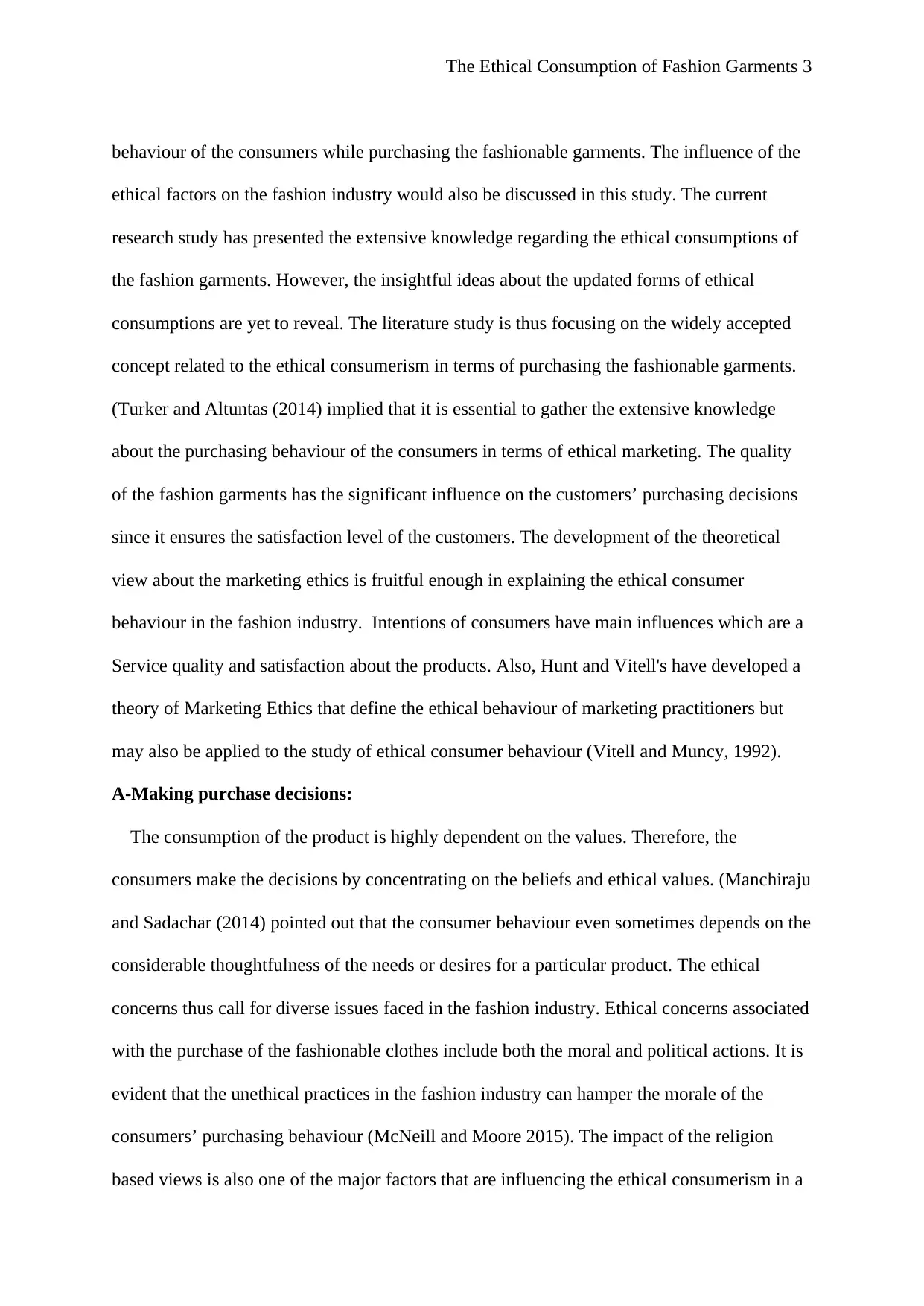
The Ethical Consumption of Fashion Garments 3
behaviour of the consumers while purchasing the fashionable garments. The influence of the
ethical factors on the fashion industry would also be discussed in this study. The current
research study has presented the extensive knowledge regarding the ethical consumptions of
the fashion garments. However, the insightful ideas about the updated forms of ethical
consumptions are yet to reveal. The literature study is thus focusing on the widely accepted
concept related to the ethical consumerism in terms of purchasing the fashionable garments.
(Turker and Altuntas (2014) implied that it is essential to gather the extensive knowledge
about the purchasing behaviour of the consumers in terms of ethical marketing. The quality
of the fashion garments has the significant influence on the customers’ purchasing decisions
since it ensures the satisfaction level of the customers. The development of the theoretical
view about the marketing ethics is fruitful enough in explaining the ethical consumer
behaviour in the fashion industry. Intentions of consumers have main influences which are a
Service quality and satisfaction about the products. Also, Hunt and Vitell's have developed a
theory of Marketing Ethics that define the ethical behaviour of marketing practitioners but
may also be applied to the study of ethical consumer behaviour (Vitell and Muncy, 1992).
A-Making purchase decisions:
The consumption of the product is highly dependent on the values. Therefore, the
consumers make the decisions by concentrating on the beliefs and ethical values. (Manchiraju
and Sadachar (2014) pointed out that the consumer behaviour even sometimes depends on the
considerable thoughtfulness of the needs or desires for a particular product. The ethical
concerns thus call for diverse issues faced in the fashion industry. Ethical concerns associated
with the purchase of the fashionable clothes include both the moral and political actions. It is
evident that the unethical practices in the fashion industry can hamper the morale of the
consumers’ purchasing behaviour (McNeill and Moore 2015). The impact of the religion
based views is also one of the major factors that are influencing the ethical consumerism in a
behaviour of the consumers while purchasing the fashionable garments. The influence of the
ethical factors on the fashion industry would also be discussed in this study. The current
research study has presented the extensive knowledge regarding the ethical consumptions of
the fashion garments. However, the insightful ideas about the updated forms of ethical
consumptions are yet to reveal. The literature study is thus focusing on the widely accepted
concept related to the ethical consumerism in terms of purchasing the fashionable garments.
(Turker and Altuntas (2014) implied that it is essential to gather the extensive knowledge
about the purchasing behaviour of the consumers in terms of ethical marketing. The quality
of the fashion garments has the significant influence on the customers’ purchasing decisions
since it ensures the satisfaction level of the customers. The development of the theoretical
view about the marketing ethics is fruitful enough in explaining the ethical consumer
behaviour in the fashion industry. Intentions of consumers have main influences which are a
Service quality and satisfaction about the products. Also, Hunt and Vitell's have developed a
theory of Marketing Ethics that define the ethical behaviour of marketing practitioners but
may also be applied to the study of ethical consumer behaviour (Vitell and Muncy, 1992).
A-Making purchase decisions:
The consumption of the product is highly dependent on the values. Therefore, the
consumers make the decisions by concentrating on the beliefs and ethical values. (Manchiraju
and Sadachar (2014) pointed out that the consumer behaviour even sometimes depends on the
considerable thoughtfulness of the needs or desires for a particular product. The ethical
concerns thus call for diverse issues faced in the fashion industry. Ethical concerns associated
with the purchase of the fashionable clothes include both the moral and political actions. It is
evident that the unethical practices in the fashion industry can hamper the morale of the
consumers’ purchasing behaviour (McNeill and Moore 2015). The impact of the religion
based views is also one of the major factors that are influencing the ethical consumerism in a
⊘ This is a preview!⊘
Do you want full access?
Subscribe today to unlock all pages.

Trusted by 1+ million students worldwide
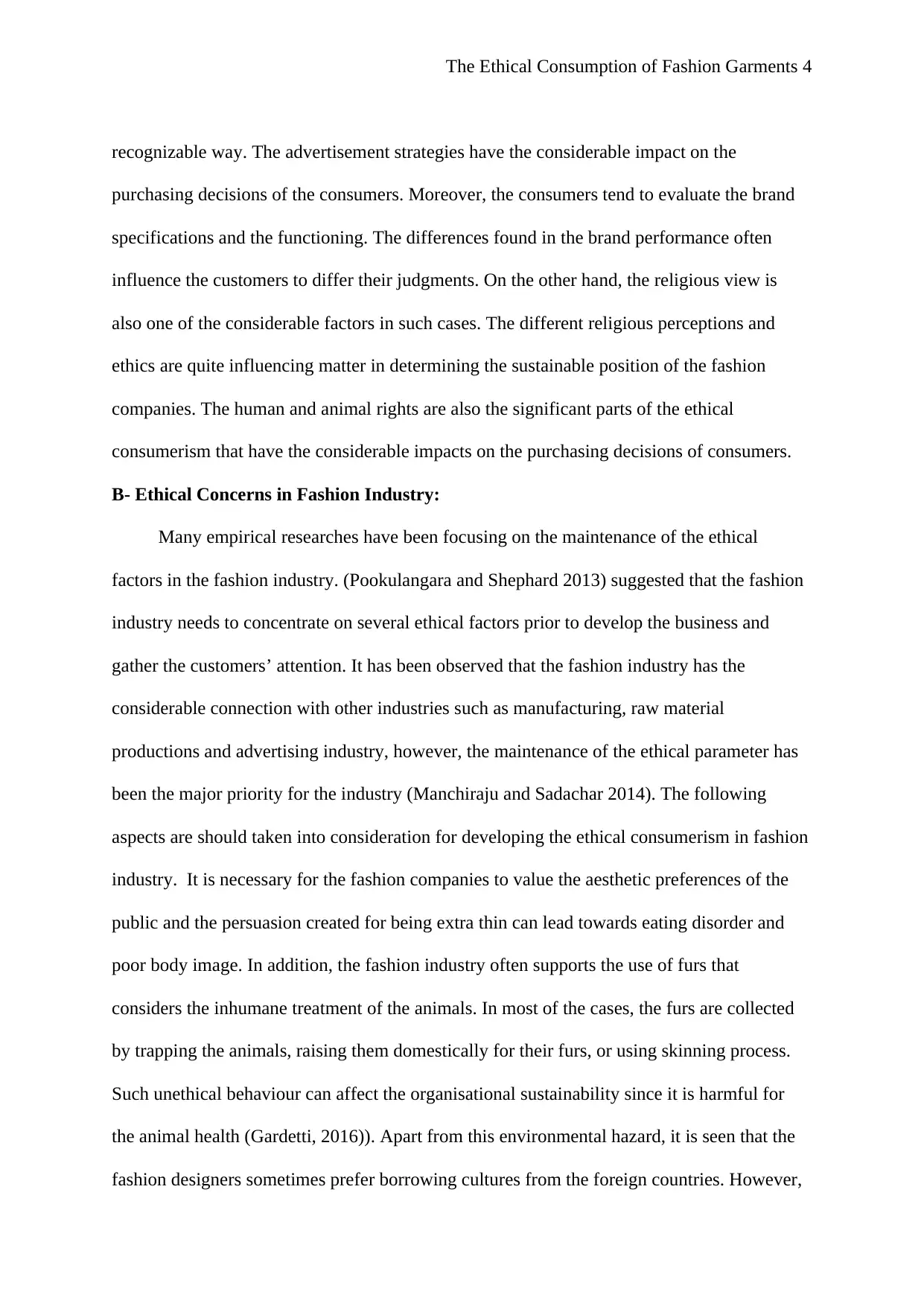
The Ethical Consumption of Fashion Garments 4
recognizable way. The advertisement strategies have the considerable impact on the
purchasing decisions of the consumers. Moreover, the consumers tend to evaluate the brand
specifications and the functioning. The differences found in the brand performance often
influence the customers to differ their judgments. On the other hand, the religious view is
also one of the considerable factors in such cases. The different religious perceptions and
ethics are quite influencing matter in determining the sustainable position of the fashion
companies. The human and animal rights are also the significant parts of the ethical
consumerism that have the considerable impacts on the purchasing decisions of consumers.
B- Ethical Concerns in Fashion Industry:
Many empirical researches have been focusing on the maintenance of the ethical
factors in the fashion industry. (Pookulangara and Shephard 2013) suggested that the fashion
industry needs to concentrate on several ethical factors prior to develop the business and
gather the customers’ attention. It has been observed that the fashion industry has the
considerable connection with other industries such as manufacturing, raw material
productions and advertising industry, however, the maintenance of the ethical parameter has
been the major priority for the industry (Manchiraju and Sadachar 2014). The following
aspects are should taken into consideration for developing the ethical consumerism in fashion
industry. It is necessary for the fashion companies to value the aesthetic preferences of the
public and the persuasion created for being extra thin can lead towards eating disorder and
poor body image. In addition, the fashion industry often supports the use of furs that
considers the inhumane treatment of the animals. In most of the cases, the furs are collected
by trapping the animals, raising them domestically for their furs, or using skinning process.
Such unethical behaviour can affect the organisational sustainability since it is harmful for
the animal health (Gardetti, 2016)). Apart from this environmental hazard, it is seen that the
fashion designers sometimes prefer borrowing cultures from the foreign countries. However,
recognizable way. The advertisement strategies have the considerable impact on the
purchasing decisions of the consumers. Moreover, the consumers tend to evaluate the brand
specifications and the functioning. The differences found in the brand performance often
influence the customers to differ their judgments. On the other hand, the religious view is
also one of the considerable factors in such cases. The different religious perceptions and
ethics are quite influencing matter in determining the sustainable position of the fashion
companies. The human and animal rights are also the significant parts of the ethical
consumerism that have the considerable impacts on the purchasing decisions of consumers.
B- Ethical Concerns in Fashion Industry:
Many empirical researches have been focusing on the maintenance of the ethical
factors in the fashion industry. (Pookulangara and Shephard 2013) suggested that the fashion
industry needs to concentrate on several ethical factors prior to develop the business and
gather the customers’ attention. It has been observed that the fashion industry has the
considerable connection with other industries such as manufacturing, raw material
productions and advertising industry, however, the maintenance of the ethical parameter has
been the major priority for the industry (Manchiraju and Sadachar 2014). The following
aspects are should taken into consideration for developing the ethical consumerism in fashion
industry. It is necessary for the fashion companies to value the aesthetic preferences of the
public and the persuasion created for being extra thin can lead towards eating disorder and
poor body image. In addition, the fashion industry often supports the use of furs that
considers the inhumane treatment of the animals. In most of the cases, the furs are collected
by trapping the animals, raising them domestically for their furs, or using skinning process.
Such unethical behaviour can affect the organisational sustainability since it is harmful for
the animal health (Gardetti, 2016)). Apart from this environmental hazard, it is seen that the
fashion designers sometimes prefer borrowing cultures from the foreign countries. However,
Paraphrase This Document
Need a fresh take? Get an instant paraphrase of this document with our AI Paraphraser
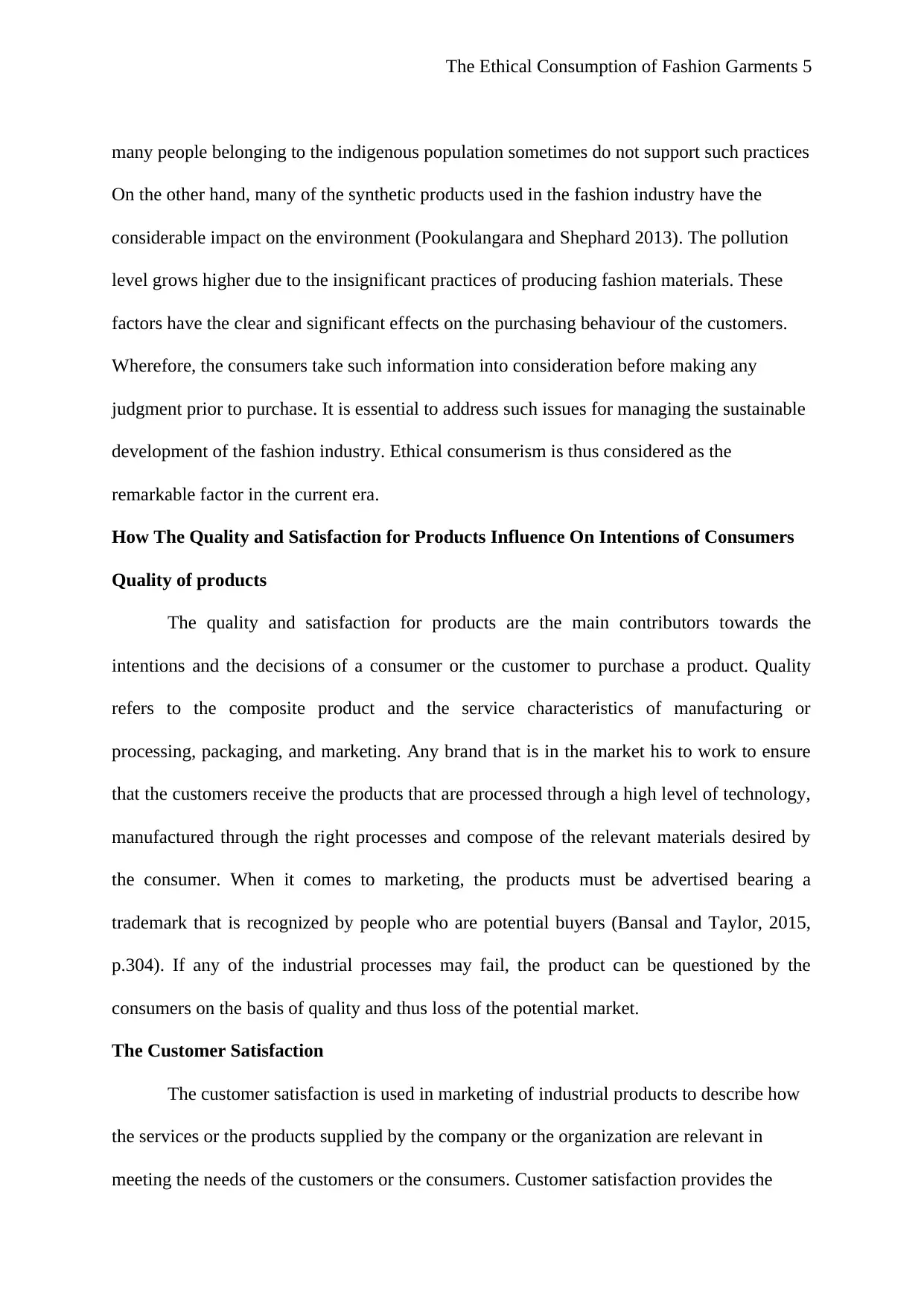
The Ethical Consumption of Fashion Garments 5
many people belonging to the indigenous population sometimes do not support such practices
On the other hand, many of the synthetic products used in the fashion industry have the
considerable impact on the environment (Pookulangara and Shephard 2013). The pollution
level grows higher due to the insignificant practices of producing fashion materials. These
factors have the clear and significant effects on the purchasing behaviour of the customers.
Wherefore, the consumers take such information into consideration before making any
judgment prior to purchase. It is essential to address such issues for managing the sustainable
development of the fashion industry. Ethical consumerism is thus considered as the
remarkable factor in the current era.
How The Quality and Satisfaction for Products Influence On Intentions of Consumers
Quality of products
The quality and satisfaction for products are the main contributors towards the
intentions and the decisions of a consumer or the customer to purchase a product. Quality
refers to the composite product and the service characteristics of manufacturing or
processing, packaging, and marketing. Any brand that is in the market his to work to ensure
that the customers receive the products that are processed through a high level of technology,
manufactured through the right processes and compose of the relevant materials desired by
the consumer. When it comes to marketing, the products must be advertised bearing a
trademark that is recognized by people who are potential buyers (Bansal and Taylor, 2015,
p.304). If any of the industrial processes may fail, the product can be questioned by the
consumers on the basis of quality and thus loss of the potential market.
The Customer Satisfaction
The customer satisfaction is used in marketing of industrial products to describe how
the services or the products supplied by the company or the organization are relevant in
meeting the needs of the customers or the consumers. Customer satisfaction provides the
many people belonging to the indigenous population sometimes do not support such practices
On the other hand, many of the synthetic products used in the fashion industry have the
considerable impact on the environment (Pookulangara and Shephard 2013). The pollution
level grows higher due to the insignificant practices of producing fashion materials. These
factors have the clear and significant effects on the purchasing behaviour of the customers.
Wherefore, the consumers take such information into consideration before making any
judgment prior to purchase. It is essential to address such issues for managing the sustainable
development of the fashion industry. Ethical consumerism is thus considered as the
remarkable factor in the current era.
How The Quality and Satisfaction for Products Influence On Intentions of Consumers
Quality of products
The quality and satisfaction for products are the main contributors towards the
intentions and the decisions of a consumer or the customer to purchase a product. Quality
refers to the composite product and the service characteristics of manufacturing or
processing, packaging, and marketing. Any brand that is in the market his to work to ensure
that the customers receive the products that are processed through a high level of technology,
manufactured through the right processes and compose of the relevant materials desired by
the consumer. When it comes to marketing, the products must be advertised bearing a
trademark that is recognized by people who are potential buyers (Bansal and Taylor, 2015,
p.304). If any of the industrial processes may fail, the product can be questioned by the
consumers on the basis of quality and thus loss of the potential market.
The Customer Satisfaction
The customer satisfaction is used in marketing of industrial products to describe how
the services or the products supplied by the company or the organization are relevant in
meeting the needs of the customers or the consumers. Customer satisfaction provides the
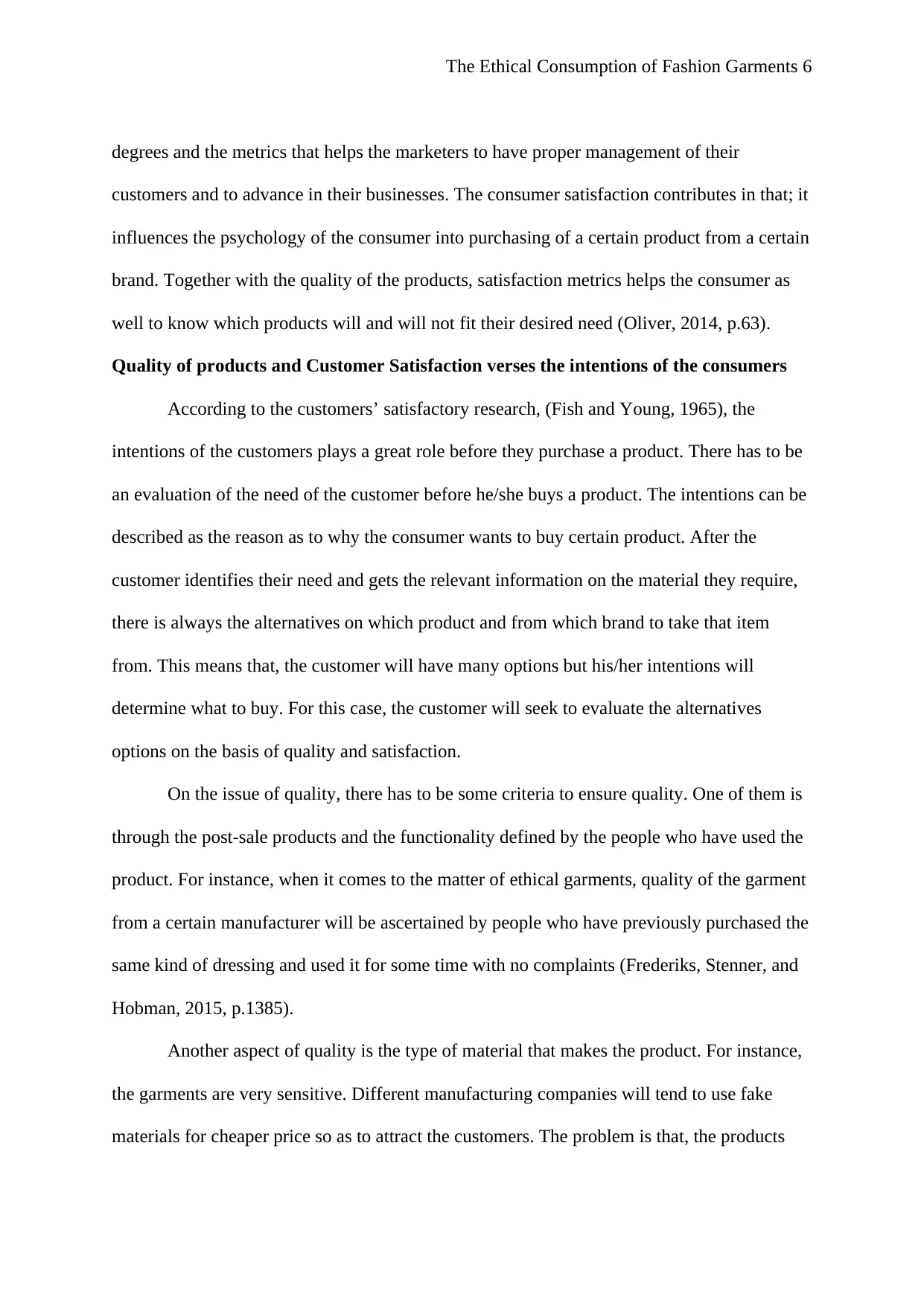
The Ethical Consumption of Fashion Garments 6
degrees and the metrics that helps the marketers to have proper management of their
customers and to advance in their businesses. The consumer satisfaction contributes in that; it
influences the psychology of the consumer into purchasing of a certain product from a certain
brand. Together with the quality of the products, satisfaction metrics helps the consumer as
well to know which products will and will not fit their desired need (Oliver, 2014, p.63).
Quality of products and Customer Satisfaction verses the intentions of the consumers
According to the customers’ satisfactory research, (Fish and Young, 1965), the
intentions of the customers plays a great role before they purchase a product. There has to be
an evaluation of the need of the customer before he/she buys a product. The intentions can be
described as the reason as to why the consumer wants to buy certain product. After the
customer identifies their need and gets the relevant information on the material they require,
there is always the alternatives on which product and from which brand to take that item
from. This means that, the customer will have many options but his/her intentions will
determine what to buy. For this case, the customer will seek to evaluate the alternatives
options on the basis of quality and satisfaction.
On the issue of quality, there has to be some criteria to ensure quality. One of them is
through the post-sale products and the functionality defined by the people who have used the
product. For instance, when it comes to the matter of ethical garments, quality of the garment
from a certain manufacturer will be ascertained by people who have previously purchased the
same kind of dressing and used it for some time with no complaints (Frederiks, Stenner, and
Hobman, 2015, p.1385).
Another aspect of quality is the type of material that makes the product. For instance,
the garments are very sensitive. Different manufacturing companies will tend to use fake
materials for cheaper price so as to attract the customers. The problem is that, the products
degrees and the metrics that helps the marketers to have proper management of their
customers and to advance in their businesses. The consumer satisfaction contributes in that; it
influences the psychology of the consumer into purchasing of a certain product from a certain
brand. Together with the quality of the products, satisfaction metrics helps the consumer as
well to know which products will and will not fit their desired need (Oliver, 2014, p.63).
Quality of products and Customer Satisfaction verses the intentions of the consumers
According to the customers’ satisfactory research, (Fish and Young, 1965), the
intentions of the customers plays a great role before they purchase a product. There has to be
an evaluation of the need of the customer before he/she buys a product. The intentions can be
described as the reason as to why the consumer wants to buy certain product. After the
customer identifies their need and gets the relevant information on the material they require,
there is always the alternatives on which product and from which brand to take that item
from. This means that, the customer will have many options but his/her intentions will
determine what to buy. For this case, the customer will seek to evaluate the alternatives
options on the basis of quality and satisfaction.
On the issue of quality, there has to be some criteria to ensure quality. One of them is
through the post-sale products and the functionality defined by the people who have used the
product. For instance, when it comes to the matter of ethical garments, quality of the garment
from a certain manufacturer will be ascertained by people who have previously purchased the
same kind of dressing and used it for some time with no complaints (Frederiks, Stenner, and
Hobman, 2015, p.1385).
Another aspect of quality is the type of material that makes the product. For instance,
the garments are very sensitive. Different manufacturing companies will tend to use fake
materials for cheaper price so as to attract the customers. The problem is that, the products
⊘ This is a preview!⊘
Do you want full access?
Subscribe today to unlock all pages.

Trusted by 1+ million students worldwide
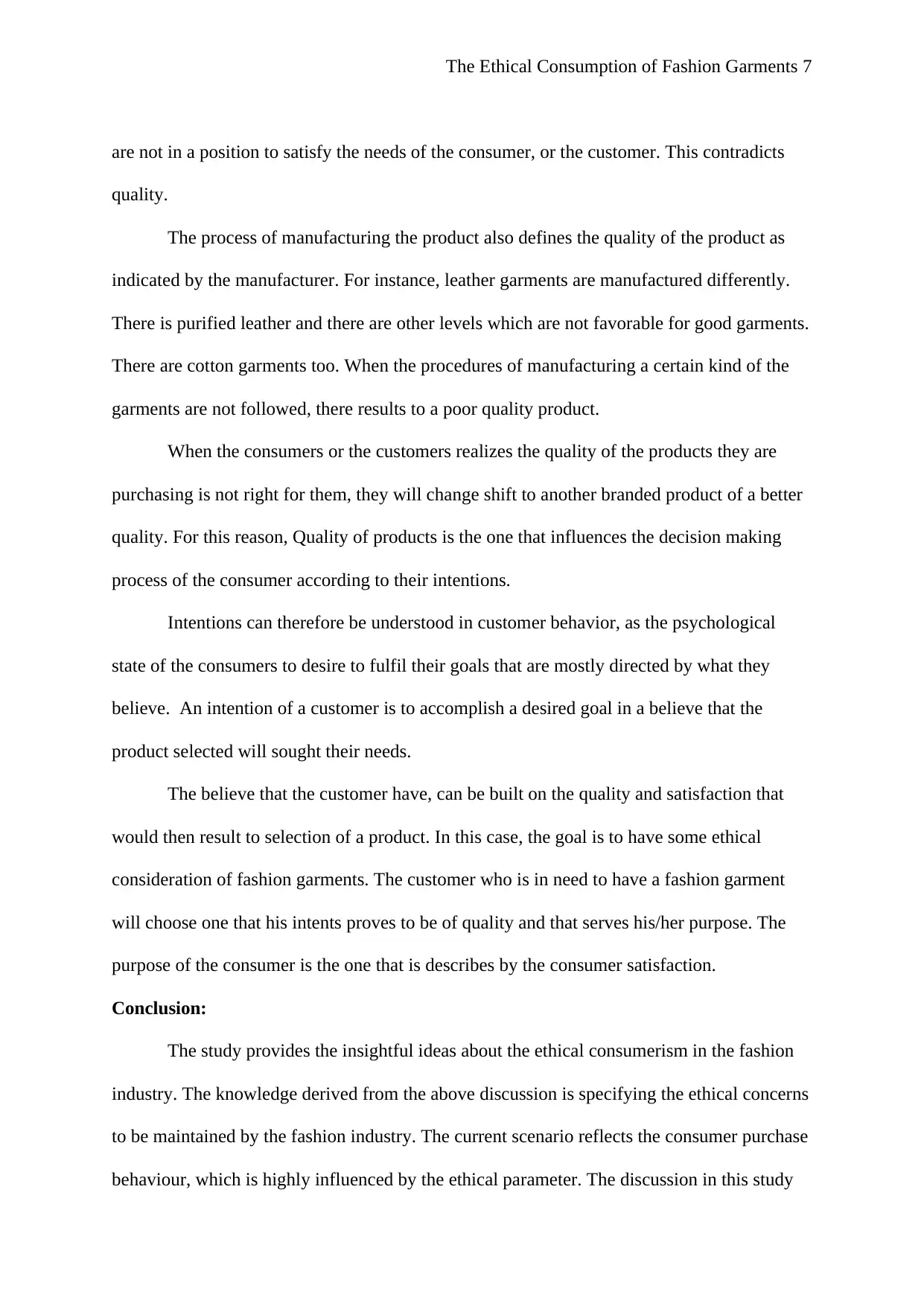
The Ethical Consumption of Fashion Garments 7
are not in a position to satisfy the needs of the consumer, or the customer. This contradicts
quality.
The process of manufacturing the product also defines the quality of the product as
indicated by the manufacturer. For instance, leather garments are manufactured differently.
There is purified leather and there are other levels which are not favorable for good garments.
There are cotton garments too. When the procedures of manufacturing a certain kind of the
garments are not followed, there results to a poor quality product.
When the consumers or the customers realizes the quality of the products they are
purchasing is not right for them, they will change shift to another branded product of a better
quality. For this reason, Quality of products is the one that influences the decision making
process of the consumer according to their intentions.
Intentions can therefore be understood in customer behavior, as the psychological
state of the consumers to desire to fulfil their goals that are mostly directed by what they
believe. An intention of a customer is to accomplish a desired goal in a believe that the
product selected will sought their needs.
The believe that the customer have, can be built on the quality and satisfaction that
would then result to selection of a product. In this case, the goal is to have some ethical
consideration of fashion garments. The customer who is in need to have a fashion garment
will choose one that his intents proves to be of quality and that serves his/her purpose. The
purpose of the consumer is the one that is describes by the consumer satisfaction.
Conclusion:
The study provides the insightful ideas about the ethical consumerism in the fashion
industry. The knowledge derived from the above discussion is specifying the ethical concerns
to be maintained by the fashion industry. The current scenario reflects the consumer purchase
behaviour, which is highly influenced by the ethical parameter. The discussion in this study
are not in a position to satisfy the needs of the consumer, or the customer. This contradicts
quality.
The process of manufacturing the product also defines the quality of the product as
indicated by the manufacturer. For instance, leather garments are manufactured differently.
There is purified leather and there are other levels which are not favorable for good garments.
There are cotton garments too. When the procedures of manufacturing a certain kind of the
garments are not followed, there results to a poor quality product.
When the consumers or the customers realizes the quality of the products they are
purchasing is not right for them, they will change shift to another branded product of a better
quality. For this reason, Quality of products is the one that influences the decision making
process of the consumer according to their intentions.
Intentions can therefore be understood in customer behavior, as the psychological
state of the consumers to desire to fulfil their goals that are mostly directed by what they
believe. An intention of a customer is to accomplish a desired goal in a believe that the
product selected will sought their needs.
The believe that the customer have, can be built on the quality and satisfaction that
would then result to selection of a product. In this case, the goal is to have some ethical
consideration of fashion garments. The customer who is in need to have a fashion garment
will choose one that his intents proves to be of quality and that serves his/her purpose. The
purpose of the consumer is the one that is describes by the consumer satisfaction.
Conclusion:
The study provides the insightful ideas about the ethical consumerism in the fashion
industry. The knowledge derived from the above discussion is specifying the ethical concerns
to be maintained by the fashion industry. The current scenario reflects the consumer purchase
behaviour, which is highly influenced by the ethical parameter. The discussion in this study
Paraphrase This Document
Need a fresh take? Get an instant paraphrase of this document with our AI Paraphraser
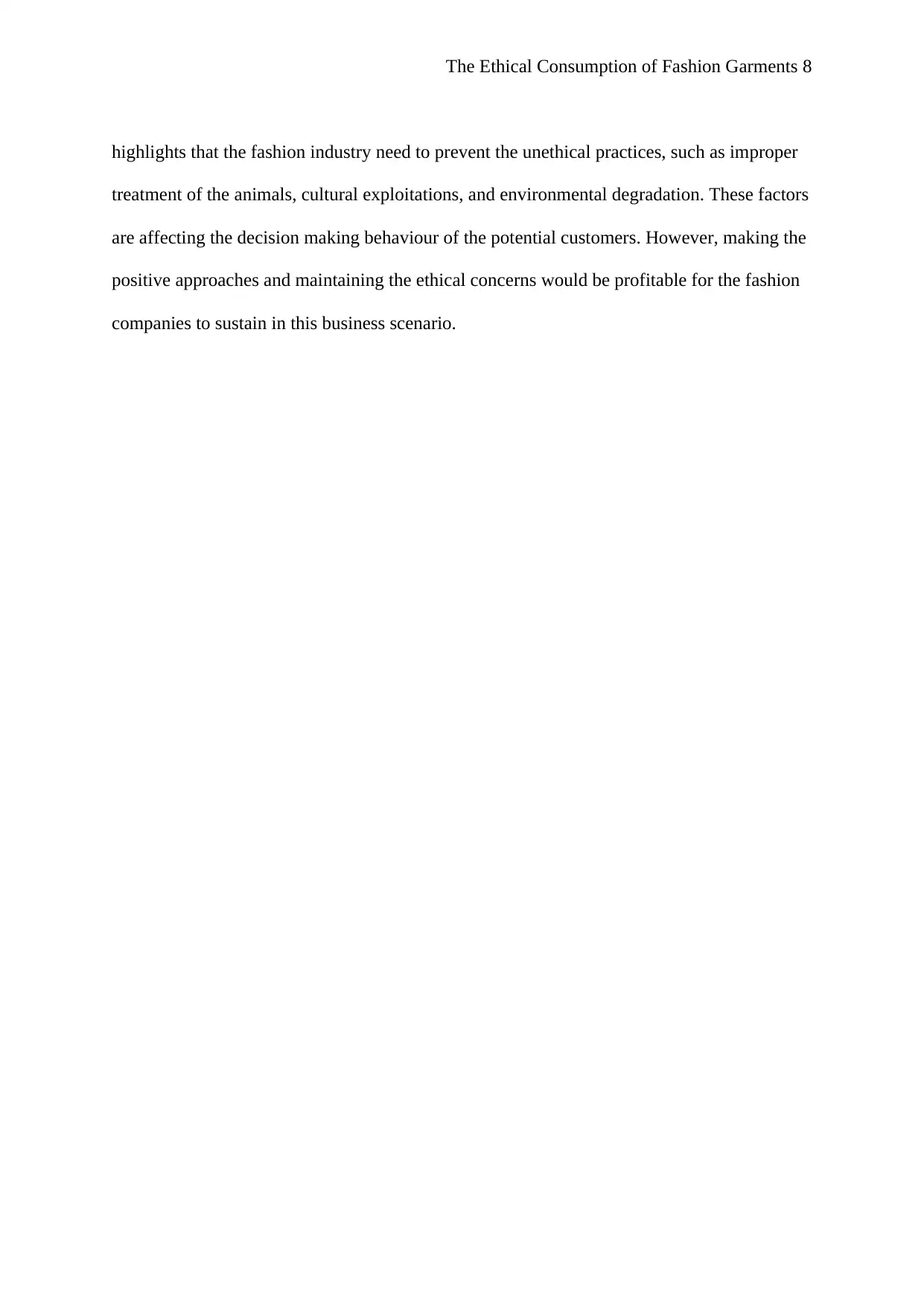
The Ethical Consumption of Fashion Garments 8
highlights that the fashion industry need to prevent the unethical practices, such as improper
treatment of the animals, cultural exploitations, and environmental degradation. These factors
are affecting the decision making behaviour of the potential customers. However, making the
positive approaches and maintaining the ethical concerns would be profitable for the fashion
companies to sustain in this business scenario.
highlights that the fashion industry need to prevent the unethical practices, such as improper
treatment of the animals, cultural exploitations, and environmental degradation. These factors
are affecting the decision making behaviour of the potential customers. However, making the
positive approaches and maintaining the ethical concerns would be profitable for the fashion
companies to sustain in this business scenario.
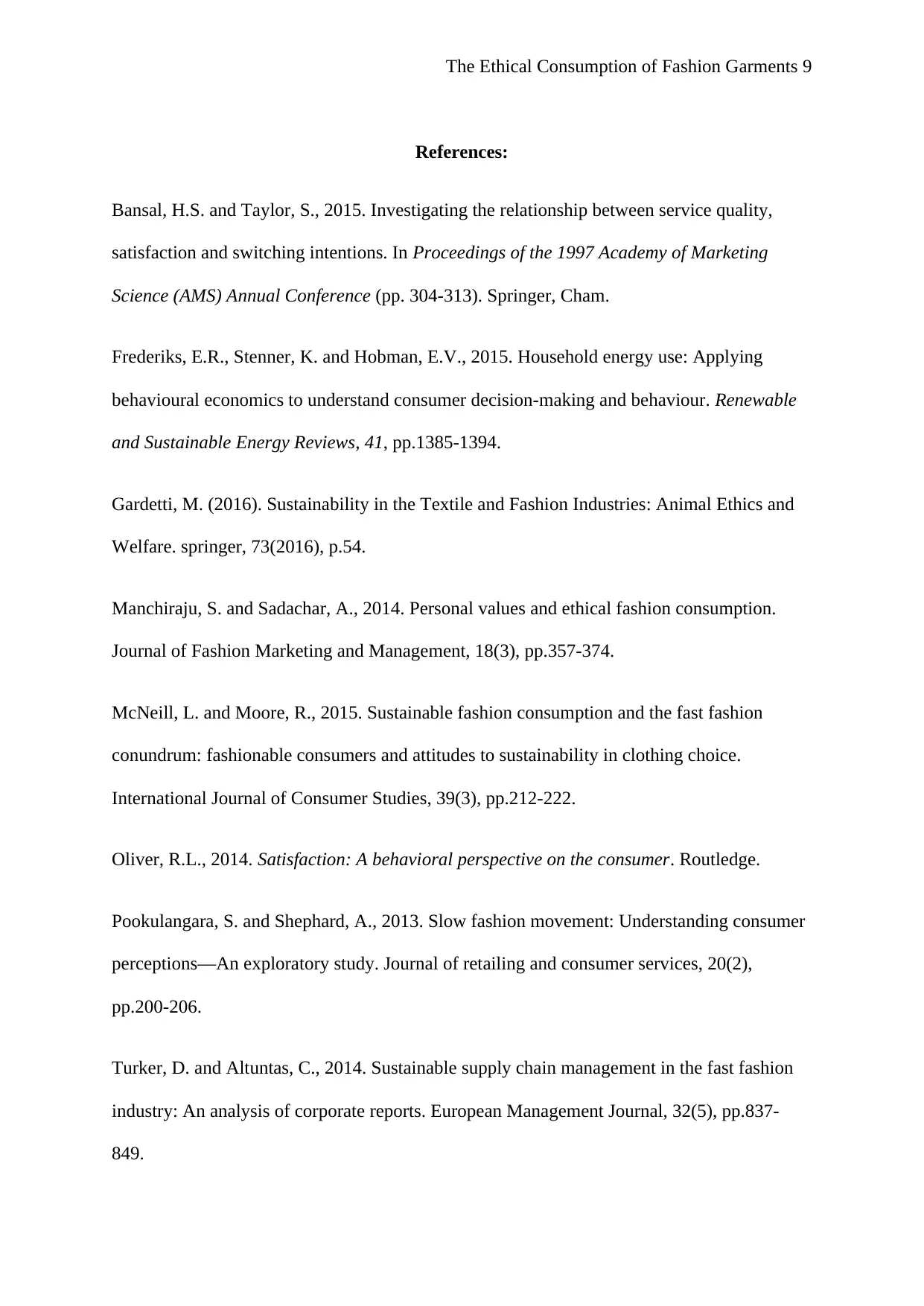
The Ethical Consumption of Fashion Garments 9
References:
Bansal, H.S. and Taylor, S., 2015. Investigating the relationship between service quality,
satisfaction and switching intentions. In Proceedings of the 1997 Academy of Marketing
Science (AMS) Annual Conference (pp. 304-313). Springer, Cham.
Frederiks, E.R., Stenner, K. and Hobman, E.V., 2015. Household energy use: Applying
behavioural economics to understand consumer decision-making and behaviour. Renewable
and Sustainable Energy Reviews, 41, pp.1385-1394.
Gardetti, M. (2016). Sustainability in the Textile and Fashion Industries: Animal Ethics and
Welfare. springer, 73(2016), p.54.
Manchiraju, S. and Sadachar, A., 2014. Personal values and ethical fashion consumption.
Journal of Fashion Marketing and Management, 18(3), pp.357-374.
McNeill, L. and Moore, R., 2015. Sustainable fashion consumption and the fast fashion
conundrum: fashionable consumers and attitudes to sustainability in clothing choice.
International Journal of Consumer Studies, 39(3), pp.212-222.
Oliver, R.L., 2014. Satisfaction: A behavioral perspective on the consumer. Routledge.
Pookulangara, S. and Shephard, A., 2013. Slow fashion movement: Understanding consumer
perceptions—An exploratory study. Journal of retailing and consumer services, 20(2),
pp.200-206.
Turker, D. and Altuntas, C., 2014. Sustainable supply chain management in the fast fashion
industry: An analysis of corporate reports. European Management Journal, 32(5), pp.837-
849.
References:
Bansal, H.S. and Taylor, S., 2015. Investigating the relationship between service quality,
satisfaction and switching intentions. In Proceedings of the 1997 Academy of Marketing
Science (AMS) Annual Conference (pp. 304-313). Springer, Cham.
Frederiks, E.R., Stenner, K. and Hobman, E.V., 2015. Household energy use: Applying
behavioural economics to understand consumer decision-making and behaviour. Renewable
and Sustainable Energy Reviews, 41, pp.1385-1394.
Gardetti, M. (2016). Sustainability in the Textile and Fashion Industries: Animal Ethics and
Welfare. springer, 73(2016), p.54.
Manchiraju, S. and Sadachar, A., 2014. Personal values and ethical fashion consumption.
Journal of Fashion Marketing and Management, 18(3), pp.357-374.
McNeill, L. and Moore, R., 2015. Sustainable fashion consumption and the fast fashion
conundrum: fashionable consumers and attitudes to sustainability in clothing choice.
International Journal of Consumer Studies, 39(3), pp.212-222.
Oliver, R.L., 2014. Satisfaction: A behavioral perspective on the consumer. Routledge.
Pookulangara, S. and Shephard, A., 2013. Slow fashion movement: Understanding consumer
perceptions—An exploratory study. Journal of retailing and consumer services, 20(2),
pp.200-206.
Turker, D. and Altuntas, C., 2014. Sustainable supply chain management in the fast fashion
industry: An analysis of corporate reports. European Management Journal, 32(5), pp.837-
849.
⊘ This is a preview!⊘
Do you want full access?
Subscribe today to unlock all pages.

Trusted by 1+ million students worldwide
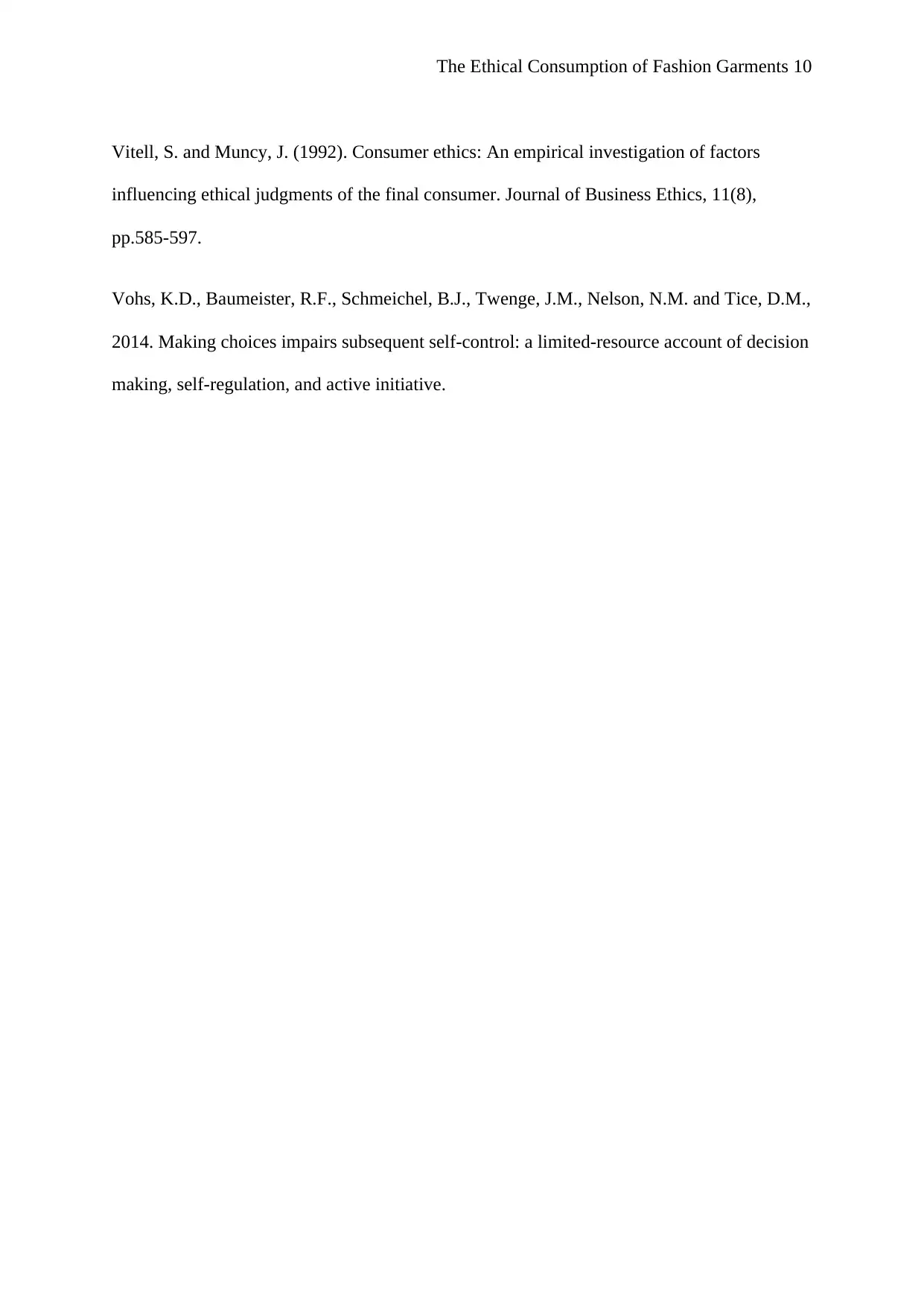
The Ethical Consumption of Fashion Garments 10
Vitell, S. and Muncy, J. (1992). Consumer ethics: An empirical investigation of factors
influencing ethical judgments of the final consumer. Journal of Business Ethics, 11(8),
pp.585-597.
Vohs, K.D., Baumeister, R.F., Schmeichel, B.J., Twenge, J.M., Nelson, N.M. and Tice, D.M.,
2014. Making choices impairs subsequent self-control: a limited-resource account of decision
making, self-regulation, and active initiative.
Vitell, S. and Muncy, J. (1992). Consumer ethics: An empirical investigation of factors
influencing ethical judgments of the final consumer. Journal of Business Ethics, 11(8),
pp.585-597.
Vohs, K.D., Baumeister, R.F., Schmeichel, B.J., Twenge, J.M., Nelson, N.M. and Tice, D.M.,
2014. Making choices impairs subsequent self-control: a limited-resource account of decision
making, self-regulation, and active initiative.
1 out of 10
Related Documents
Your All-in-One AI-Powered Toolkit for Academic Success.
+13062052269
info@desklib.com
Available 24*7 on WhatsApp / Email
![[object Object]](/_next/static/media/star-bottom.7253800d.svg)
Unlock your academic potential
Copyright © 2020–2026 A2Z Services. All Rights Reserved. Developed and managed by ZUCOL.





